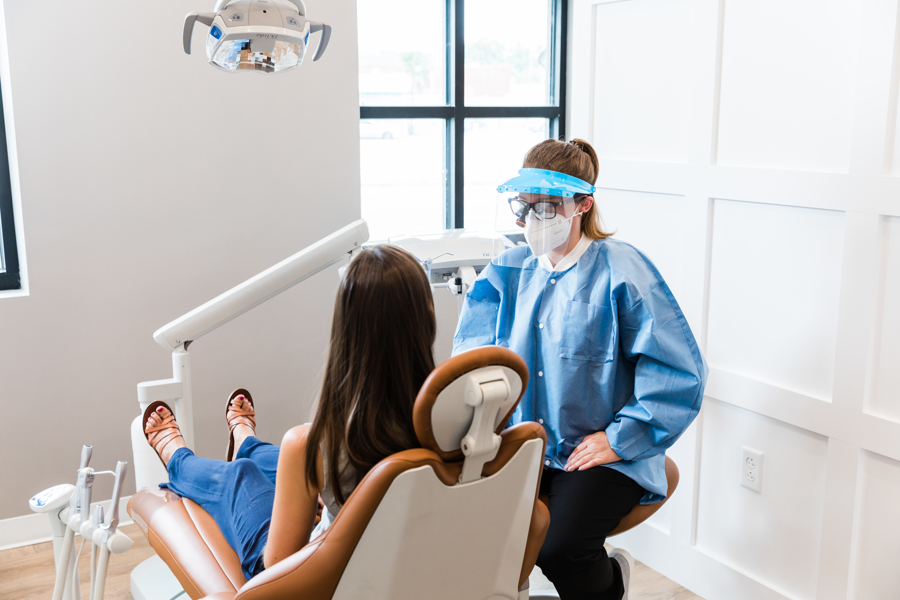Why You Must Choose a Neighborhood Dentist Eugene for Personalized Care
Why You Must Choose a Neighborhood Dentist Eugene for Personalized Care
Blog Article
An Overview to Typical Oral Problems That Require a Dental professional's Care
Toothaches, for example, can be symptomatic of extreme problems such as tooth cavities, split teeth, or abscesses, each needing particular interventions like fillings or origin canals. Impacted knowledge teeth and jaw problems can introduce substantial discomfort and issues.
Toothaches
Toothaches are a typical dental condition that can range from light pain to extreme pain, usually suggesting an underlying problem that needs specialist attention. This pain can stem from a selection of resources, consisting of tooth decays, broken or fractured teeth, and oral abscesses. Each of these problems positions significant threats if left unattended, possibly bring about a lot more severe difficulties.
Dental cavities, also known as cavities, are triggered by the accumulation of plaque that erodes tooth enamel, leading to openings or pits in the impacted teeth. Abscesses are unpleasant infections at the origin of a tooth or between the gum tissue and a tooth, normally resulting from extreme degeneration or neglected dental caries.
Efficient therapy of toothaches entails resolving the root reason. This may consist of fillings for cavities, crowns for cracked teeth, or origin canals and anti-biotics for abscesses. Very early intervention by a dental professional can protect against further damage and relieve discomfort, guaranteeing optimal oral health.
Gum Disease
Gum tissue illness, a widespread yet typically ignored oral condition, shows up via swelling and infection of the gum tissues and supporting cells. This condition largely happens in 2 stages: gingivitis and periodontitis. Gingivitis, the milder kind, presents with symptoms such as red, swollen gum tissues that may bleed easily during cleaning or flossing. If left neglected, gingivitis can progress to periodontitis, a more serious kind identified by the destruction of the supporting bone and connective tissue, ultimately causing missing teeth.
The primary reason for gum tissue condition is microbial plaque, a sticky, colorless film that frequently bases on teeth. Poor oral hygiene, smoking, hereditary predisposition, and certain clinical conditions, such as diabetic issues, can intensify the risk of creating periodontal illness. Regular dental exams are vital for very early detection and management of this condition.
Therapy for gum tissue illness varies from professional dental cleaning and scaling to even more innovative treatments like root planing and gum surgery, depending upon the intensity. Preserving excellent dental hygiene techniques, consisting of brushing two times daily, flossing, and utilizing a disinfectant mouth wash, can substantially lower the danger of gum disease and promote healthier gums.
Cavities
Cavities, also called cavities, are a typical oral problem characterized by the destruction of tooth enamel due to acid-producing microorganisms in the mouth. These bacteria thrive on sugars and starches from food and drinks, producing acids that slowly deteriorate the enamel, leading to cavity formation.
Early-stage dental caries might disappoint signs, however as they progress, they can create toothache, sensitivity to warm or cool, visible holes or pits in the teeth, and staining. If left untreated, cavities can pass through much deeper layers of the tooth, possibly leading to serious discomfort, infection, and also tooth loss.
Stopping dental caries includes a combination of good oral hygiene methods and dietary routines. Routine cleaning with fluoride tooth paste, flossing, and routine oral check-ups are vital. Dental experts may also recommend additional safety nets, such as fluoride therapies and oral sealants, to shield teeth from decay.
Minor tooth cavities can be addressed with oral fillings, which bring back the tooth's structure. Much more innovative instances may require crowns or even origin canal treatment if the degeneration has actually reached the tooth's pulp.

Impacted Knowledge Teeth
Affected knowledge teeth are a widespread dental issue that takes place when the third news molars, frequently described as wisdom teeth, fail to fully arise or line up correctly within the mouth. This problem frequently results from not enough space in the jaw or an uncommon development angle of the teeth. Affected wisdom teeth can bring about a selection of problems, consisting of damages, pain, and infection to surrounding teeth.
When knowledge teeth come to be impacted, they are commonly partly appeared or stay totally below the gum tissue line. This partial eruption can create a path for microorganisms to enter the periodontals, leading to infections that materialize as swelling, discomfort, and also hop over to here high temperature. Furthermore, influenced wisdom teeth can exert pressure on surrounding teeth, potentially causing crowding or changing.
A comprehensive oral examination, commonly involving X-rays, is crucial for identifying impacted wisdom teeth. Therapy usually involves surgical extraction, executed by a dental doctor. The treatment aims to ease pain and avoid further issues, such as cysts or damage to bordering bone frameworks. Post-operative treatment is vital to make sure correct recovery and reduce the threat of infection. Regular oral check-ups are recommended to check the problem and preserve dental health and wellness.
Jaw Conditions
Jaw disorders, jointly called temporomandibular joint (TMJ) disorders, include a range of problems that affect the jaw joint and surrounding muscular tissues. These conditions can materialize via signs and symptoms such as pain or inflammation in the jaw, difficulty chewing, a clicking or popping audio when opening or closing the mouth, and also chronic migraines. TMJ conditions can arise from numerous factors, consisting of arthritis, jaw injury, or habitual behaviors like teeth grinding or jaw clenching.
Medical diagnosis learn the facts here now of TMJ disorders generally includes a thorough assessment by a dental practitioner, consisting of a physical evaluation of the jaw, dental X-rays, and sometimes progressed imaging techniques like MRI or CT checks to evaluate the joint's condition. Non-invasive techniques such as physical treatment, dental splints, and medicines aimed at lowering swelling and pain are commonly first-line therapies.
Very early treatment by a dental specialist is important to avoid the development of TMJ problems and to maintain total dental wellness. Individuals experiencing persistent jaw discomfort or disorder ought to seek timely assessment and treatment.
Final Thought
Toothaches commonly indicate underlying issues such as dental caries, cracked teeth, or abscesses, calling for prompt treatment. Impacted knowledge teeth and jaw disorders also require expert attention to minimize pain and stop additional problems.
Oral tooth cavities, additionally known as cavities, are triggered by the buildup of plaque that deteriorates tooth enamel, leading to openings or pits in the impacted teeth. Abscesses are uncomfortable infections at the root of a tooth or in between a tooth and the periodontal, commonly resulting from serious decay or without treatment dental caries.

In addition, impacted wisdom teeth can apply pressure on surrounding teeth, possibly creating crowding or moving.
Report this page